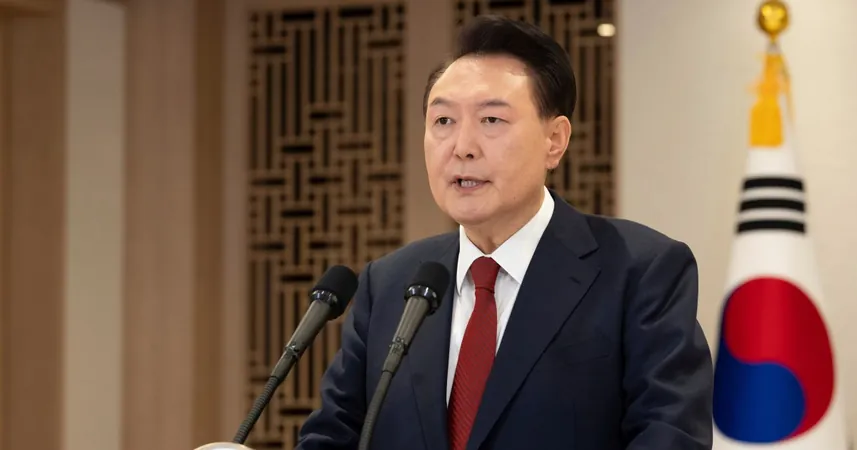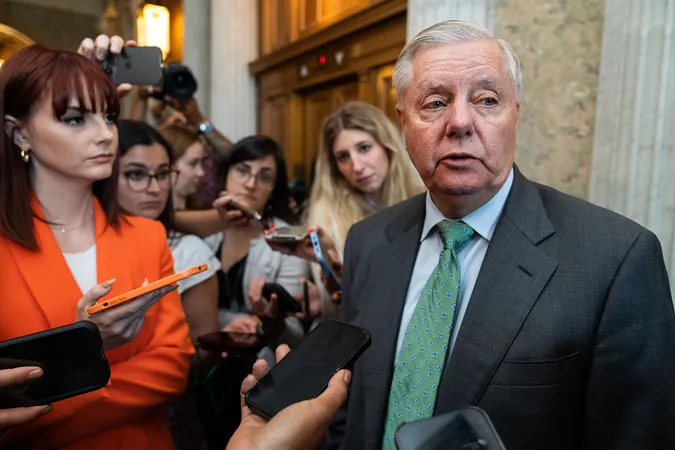
Shocking Developments in South Korea: Arrest Warrant Issued for Ex-President Yoon Suk-yeol!
2024-12-31
Author: Ken Lee
Overview of the Arrest Warrant
In a historic and unprecedented move, a South Korean court has issued an arrest warrant for former President Yoon Suk-yeol in connection with his controversial declaration of martial law. This decision marks the first time in South Korea’s history that an arrest warrant has been sought against a sitting president, signaling a potential turning point in the country’s tumultuous political landscape.
Details of the Warrant
The Seoul Western District Court granted the warrant on Tuesday, following a request from the Joint Investigation Headquarters, which is currently probing Yoon for allegations of insurrection and abuse of power. This development raises significant questions about the integrity of South Korea's political institutions and the ongoing struggles for power within its government.
Statements from Officials
“The arrest warrant requested by the Joint Investigation Headquarters was officially issued today," stated officials who included members from the Corruption Investigation Office for High-ranking Officials (CIO), police, and the Ministry of Defense. They emphasized the seriousness of the allegations against Yoon, who has faced escalating scrutiny since his controversial martial law decree on December 3rd.
Warrant Execution Challenges
Over the past weeks, Yoon's security detail has thwarted several attempts by investigators to execute search warrants at both the presidential office and Yoon's official residence. The Presidential Security Service has promised to navigate the court's decisions within the bounds of the law, yet concerns linger over how they will manage the situation should authorities decide to take action.
Possible Arrest Implications
While South Korean media speculate that an immediate arrest may not be forthcoming due to potential coordination challenges with the presidential security service, the implications of Yoon's arrest are enormous. Should he be detained, investigators will have a 48-hour window to either file for a further detention warrant or release him.
Consequences of Yoon’s Actions
The stakes are high for Yoon, who faces severe criminal penalties, including life imprisonment and even the death penalty for his actions. The constitutional implications are equally significant; while sitting presidents generally enjoy immunity from prosecution, they can still be held accountable for treason or rebellion, complicating Yoon's legal standing.
Political Dynamics
Yoon has been suspended from his presidential duties since December 14, after the National Assembly overwhelmingly voted for impeachment—204 in favor, 85 against. The situation escalated further when the opposition-controlled legislature moved to impeach acting president Han Duck-soo, transferring powers to Deputy Prime Minister Choi Sang-mok. This chaotic power shift reflects the escalating political crisis swirling around Yoon's administration.
Further Complications
Adding to the complexity, the Democratic Party argued that Han's impeachment was necessary due to his inaction over judicial appointments, which could affect the future of Yoon's impeachment proceedings. The Constitutional Court has a maximum of six months to rule on whether Yoon will be stripped of his presidency or reinstated.
Yoon's Defense
In defending his martial law decree, Yoon claims it was both legal and crucial to counter perceived threats from “anti-state forces” and opposition obstructionism. As South Korea watches closely, the repercussions of these developments will surely reshape its political landscape for years to come. Keep your eyes peeled—this scandal is only just beginning!



 Brasil (PT)
Brasil (PT)
 Canada (EN)
Canada (EN)
 Chile (ES)
Chile (ES)
 Česko (CS)
Česko (CS)
 대한민국 (KO)
대한민국 (KO)
 España (ES)
España (ES)
 France (FR)
France (FR)
 Hong Kong (EN)
Hong Kong (EN)
 Italia (IT)
Italia (IT)
 日本 (JA)
日本 (JA)
 Magyarország (HU)
Magyarország (HU)
 Norge (NO)
Norge (NO)
 Polska (PL)
Polska (PL)
 Schweiz (DE)
Schweiz (DE)
 Singapore (EN)
Singapore (EN)
 Sverige (SV)
Sverige (SV)
 Suomi (FI)
Suomi (FI)
 Türkiye (TR)
Türkiye (TR)
 الإمارات العربية المتحدة (AR)
الإمارات العربية المتحدة (AR)